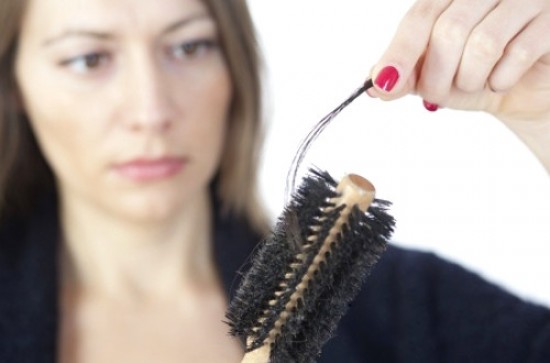When you hear commercials, hairdressers and friends talk about hair loss, you might automatically think of men; particularly older men. But, bad news ladies... hair loss is increasingly affecting women, especially younger women.
In fact, according to the American Hair Loss Association, women make up 40 percent of American hair loss sufferers.
How do you know if what you're experiencing is truly hair loss and not just shedding?
It's important to know that the American College of Dermatology says you can lose 50 to 100 strands of hair each day, and up to 250 stands if you're washing your hair. Some studies have even suggested that during certain seasons, women have a higher risk for hair loss. This is fairly typical in most women.
However, there are some signs to be looking for if you are suspecting that you're really losing your hair. For instance, if you're brushing your hair (without tugging) and a clump of hair comes out, if there are clumps on your pillow when you wake up in the morning, or if you notice bald spots on certain areas of your scalp (commonly among your hairline), you may want to consider seeing a doctor.
What could be the reason for your hair loss?
One particular reason for your hair loss is that it's simply in your genes. According to the American Academy of Dermatology, heredity is the most common reason behind hair loss and a genetic predisposition occurs in 50 percent of women.
There are other reasons such as certain medical conditions, like pregnancy, autoimmune disorders, hormonal changes, menopause, or thyroid disorders that can be the reason for your hair loss.
What is a Theradome?
Theradome is a medical device used as a laser hair treatment that helps restore and grow your hair. It is the first and only Federal Food and Drug Administration (FDA) approved over-the-counter wearable laser treatment for inside your home. Patients have a high success rate, and results are often seen within just two treatments.
What else do you need to know about hair loss in women and how Theradome works?
Former NASA scientist, Dr. Tamim Hamid, joins Dr. Mike to discuss why hair loss in women is just as -- if not more -- common in women, as well as ways you can help prevent hair loss.

Laser Hair Growth: How to Prevent Hair Loss in Women
Guest
Info & Links: Tamim Hamid, PhD
From the Show: Healthy Talk w/ Dr. Michael Smith
Summary: According to the American Hair Loss Association, women make up 40 percent of hair loss sufferers.
Guest Bio: Tamim Hamid, PhD
 From his dedicated service as a NASA bio-engineer through corporate executive leadership and founder of innovative medical device companies, Dr. Tamim Hamid's unrelenting determination to deliver value is evident through significant personal and organizational accomplishments.
From his dedicated service as a NASA bio-engineer through corporate executive leadership and founder of innovative medical device companies, Dr. Tamim Hamid's unrelenting determination to deliver value is evident through significant personal and organizational accomplishments.As a biomedical engineer at NASA, he designed and implemented leading-edge biomedical technologies that supported the success and safety of the prestigious space shuttle program its astronauts.
As a leader of worldwide medical sales, marketing, engineering, manufacturing and logistics for Sanmina, a $13 Billion NASDAQ-listed company international medical device company, in Asia, Europe, and the Americas, he grew division revenues four-fold.
As a principal executive in successful biomedical start-ups, Outreach and QuVis, he spearheaded innovative endeavors that were profitably sold to major medical device companies.
Today, Tamim combines the expertise and experience of a highly skilled biomedical scientist, a successful corporate executive and an innovative entrepreneur with a passion based on personal experience as the founder and CEO of Theradome, a biomedical device design and manufacturing company.
Focused on solving the global dilemma of hair loss through clinically proven safe and effective photochemical stimulation hair restoration techniques, Theradome is developing next-generation technologies that are now accessible, affordable and convenient for the millions of people across the globe suffering from hair loss.
His educational accomplishments include: Bachelor of Science in Electrical Engineering, Master of Science in Computer Engineering and a Ph.D. (ABD) in Biomedical Engineering.
- Organization: Theradome
Tagged under
More from this show . . .
How to Make Herbal Remedies in Your Own KitchenAsk Dr. Mike: Autoimmune Diseases, Adrenal Fatigue & Diabetes
Prev
Next
How to Make Herbal Remedies in Your Own KitchenAsk Dr. Mike: Autoimmune Diseases, Adrenal Fatigue & Diabetes




